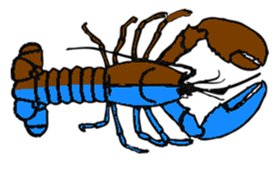March is just around the corner, so there are just a couple of weeks before the CMDB and Genetics program students and faculty will be joining me for a weekend in Portland! As much as I want to advertise for the retreat and mention that it is student driven in that talks will be on topics selected by students, the day is structured based on student feedback, and the Saturday night social trivia session was voted in by students, I don’t want readers from other programs to feel left out of my article’s audience. Note on image: lobster coloration really can display Tufts support, the pattern occurs in bilateral gynandromorphs (half male, half female) where one side has normal black/brown color and the other side has a rare color mutation causing a blue carapace. The chance of a half blue/half brown lobster may be as little as 1 in 100 million.
Now, the real reason I mention the retreat is that over the last three months I have been collaborating with student and faculty colleagues at three separate campuses along the New England coast to help bring this retreat together. It has required learning and practicing organizational skills, shared decision-making skills, delegation, and diplomacy. These are all skills worth cultivating for anyone who may participate in scientific collaboration, so it is helpful to seek out collaborative experiences early in a scientific career. Here is how helping to plan a retreat becomes practice for collaboration and communication:
Integration of multiple viewpoints. One of the great advantages of working as a group toward a common goal is that collectively the group has abundant experience to draw from in order to propose ideas and predict where problems may arise. While planning the CMDB/Genetics retreat we felt it was important to be respectful of all organizer opinions and concerns and at the same time try to incorporate as many ideas from the retreat participants as possible. This of course meant instances when compromise and diplomacy were necessary. Delegation of point people for specific tasks also helped mitigate conflict because one person has had primary responsibility while others advise.
Faculty as peers as well as advisors. Speaking of advising, I have found that a benefit of helping to organize such a large event for the CMDB and Genetics programs has been the need to interact with many faculty and staff in a capacity slightly different from that of my usual student role. Over the course of our academic careers our view of academic mentors shifts from their being “sages on the stage” in high school, undergrad, and early graduate school, to being approachable human beings with advice that ranges far beyond the scholarly later in graduate school, post-doctoral fellowships, and early career. The increase in responsibility that comes with becoming a peer as well as an advisee is not something I think consciously about very often, so this has been a valuable exercise in examining the evolution of these relationships. Recognition of this changing role can facilitate collaborative scientific work because it gives you confidence in your value to a project.
Interaction at a distance. The CMDB/Genetics retreat brings together students and faculty from four campuses in two states, making it imperative that we utilize methods of communication that are speedy and reliable. Now imagine if we were on different continents! For the most part this has meant heavy reliance on email, but we have also found it helpful to setup online video conferencing for regular face-to-face interaction. Meetings can be tricky to schedule for groups comprised of very busy individuals, and it is easy to fall into the trap of holding too many, however they are important for quickly refocusing the group after a period of productivity. Another tool we have made extensive use of that is suitable for both near and far collaborative efforts are online workspace platforms such a Google Drive that allow multiple users to work and edit simultaneously. This is especially helpful in generating a living record of how the group’s ideas and priorities change over time. I think one of the greatest lessons I have learned from helping to organize the retreat has been realizing the importance of keeping a centralized record of decisions. It has allowed the retreat planning committee to understand the logic that got us to a particular point, and then guided us as we moved forward on a number of occasions.
The best way to improve any set of skills is to go out and practice them, so look for those collaborative opportunities!

